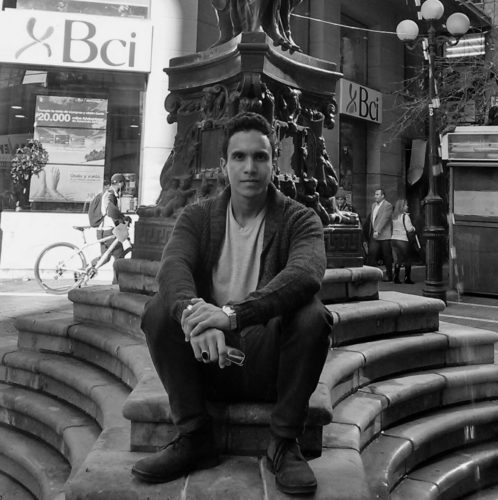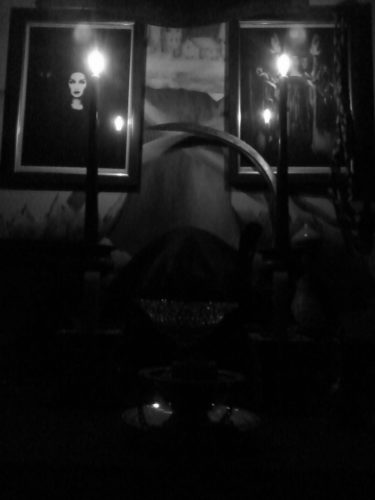Pagan Perspectives
[Today’s column is our first from our new international columnist, Alan D.D. Alan’s column will cover Paganism in Venezuela. In addition to writing for The Wild Hunt, Alan is a journalist, blogger, and novelist. We’re thrilled to have him aboard, and we hope you will be too.]
Thinking of the relationship between Venezuela and Witchcraft could be complication. Before I met L.J. Tang, I supposed there were no names I could consider when searching for a reference in the Venezeulan national context. Tang, however, who has a bachelor’s degree in international studies with a speciality in etiquette and protocol, dedicates most of his time to the Craft through the courses he teaches and the articles he writes about the occult.
When asked what made him start studying Witchcraft, Tang first specifies that he sees a difference between being a magician and being a Witch: “You can be a ceremonial magician without being a Witch, but my Witchcraft tradition contains a strong influence of ceremonial magic.” From there, he says his studies began when he was a boy. “The desire to contact that invisible world was undoubtedly my initial impulse, not just casting spells or mere curiosity.”

L. J. Tang [courtesy].
His parents at first though his interest in the occult was just a stage. “They finally accepted it,” Tang says, “and they themselves had experiences that made them respect what I did.” In comparison, he says that his friends had no problems with his interests at any point. “[They] even shared with me their own spiritual inquietudes.” Later on he would discover ceremonial magic, with which he identified because of the thorough nature of the tradition’s methods and their high level of complexity, before being called by the goddess Hekate. “There the wizard became a Witch. Now, both walk hand in hand.”
Although the dominant religion in Venezuela is Catholicism, Tang says that has not affected him at all. “Venezuela is a Catholic country by nomenclature, but most Catholics have no restraints against getting a card reading, or asking to bind a lover, or destroy an enemy.” At the same time, Tang supports remaining somewhat discrete. “Prudence is a virtue of the wise,” he notes. “I doubt that Witchcraft will ever be entirely accepted. Its own nature is asocial.”
Tang also explains that the high level of superstition in Venezuela once made for many esoteric stores, although the country’s current economic troubles have led to hard times for the occult community. “Before this crisis [ … ] Venezuela was a paradise for whoever wanted to be dedicated to magic,” he says, for the prices were more accessible. He also notes that evangelical Christianity has added difficulties to the occult community, saying that some “can be dangerous fanatics.” But from his perspectives, due to “the current political and economic disaster,” it’s not just complicated to be a Witch in Venezuela, but also to be any common citizen.
“In Venezuela, Witchcraft is everywhere,” Tang says. Despite the aforementioned challenges, Witchcraft is tolerated, “at least much better than elsewhere,” though “to say it is a positive vision may be going too far.” He finds the occult is always “suspiciously perceived, from disbelief to real fear.” He finishes by expressing that “I do not care how they see Witchcraft, as long as they respect me and do not intend to attack me physically or verbally.”

L. J. Tang’s high altar [courtesy].
Tang says that he joined said organization because of a “compromise with Hekate herself, to help others in her path of discovery.” Although “it was an initially grudging decision,” he says the goddess let him know that it was the appropriate path for him to take. Speaking of Hekate, Tang says, “Those who really get to know her will understand how persuasive she can be.”
He says that at first he rejected the goddess. “Her image was stained, in my eyes, by much of the vain New Age Pagan spirituality of the Wiccan circles of Venezuela.” Now, having given in and accepted her, he says that “Hekate became known [to me] in much more serious and profound ways. A love was born, that remains untouched until today’s sun, and the one that is to come.”
On his role as Torchbearer, the devotee to Hekate explains that he and other Torchbearers have “the responsibility to help other members of the [covenant] in their development, always having their doors open for every sincere seeker of the lady.” They are also able to open a sanctuary, which has a public role. They are expected to not only provide guidance within the covenant, but also to give open talks. Tang clarifies that these talks are “never as proselytism, but as a beacon for the right boat.”
Tang states that “this terrible situation in the country is conducive to seeking the help of the goddess to cope with the hardships of everyday life, to be protected from the excesses of the powerful and criminal, now with virtually no difference between them.” He recalls that Hekate, “as Nyktipolos, the one who wanders in the night,” is an ideal guardian at night, affirming that she has protected him from the current dangers in Venezuela, which “increase horrifically at night. Hekate saved me from many dangerous circumstances; without her I would hardly stay alive.”
In addition to his work with Hekate, Tang’s experience also includes the tradition called “Marialioncero Spiritism,” which focuses on the figure of María Lionza and her various courts. He says this is “the most Venezuelan tradition that exists, with a mixture of Catholic (white-Spanish), African, and aboriginal elements.” Although he is not a practitioner, he has a deep respect for this current.
J. L. Tang is open to provide help and guidance to those who are interested in learning from his hand. In addition to making available his personal page to educate those who are interested, he has created a recommended book section. “They have been selected by me personally as an adequate introduction to the ‘old office.’”
To learn more about J. L. Tang, or contact the Covenant, visit his blog, Facebook, or Instagram. The Covenant of Hekate maintains its own website as well.
The Wild Hunt is not responsible for links to external content.
To join a conversation on this post:
Visit our The Wild Hunt subreddit! Point your favorite browser to https://www.reddit.com/r/The_Wild_Hunt_News/, then click “JOIN”. Make sure to click the bell, too, to be notified of new articles posted to our subreddit.